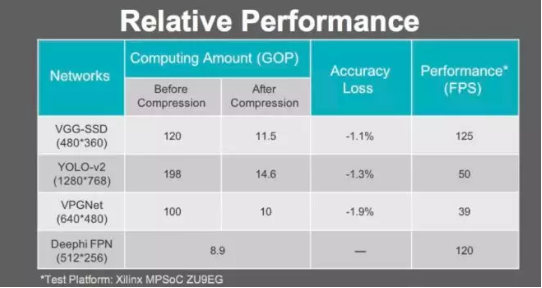Xilinx Inc. have completed the acquisition of DeePhi Tech
Time:2018-07-18 Views:1514
Today, DeePhi Tech officially quietly released a news: Xilinx has completed the acquisition of DeePhi Tech.A Beijing-based privately held start-up with industry-leading capabilities in Machine learning,speializing in deep compression,pruning and system-level optimization for neural networks.The specific acquired amount has not been disclosed. Industry insiders estimate that the acquisition amount may be around $300 million.
After the acquisition, The DeePhi Tech team will continue to operate out of its offices in Beijing, adding to the more than 200 employees Xilinx has in the Greater China Region. The financial terms of the transaction are undisclosed.
In the official press release, The CEO of DeePhi Tech named YaoSong said: “We are excited to continue our strong partnership with Xilinx and work even more closely to deliver leading machine learning solutions to our customers in China and around the world,”
“Xilinx is accompanying DeePhi Tech along its journey to explore the potential of machine learning and is supporting our innovation as one of our early investors. We look forward to continuing our joint efforts with Xilinx to bring our solutions to the next level in performance,” said Yi Shan, CTO of DeePhi Tech.
“We are thrilled to welcome DeePhi Tech to the Xilinx family and look forward to further building our leading engineering capabilities and enabling the adaptable and intelligent world,” said Salil Raje, executive vice president of Software and IP Products Group at Xilinx. “Talent and innovation are core to realizing our vision. Xilinx will continue to invest in DeePhi Tech to advance our shared goal of deploying accelerated machine learning applications in the cloud as well as at the edge.”
Join the autopilot and ADAS track
In fact, the news of the acquisition has already been circulating in the industry.
On June 26th, DeePhi Tech also announced abruptly announced that it has completed the technical integration and commercial layout for the autonomous driving/advanced assisted driving field,realized the project landing and product conversion and officially joined the autonomous driving track.
At the time, DeePhi Tech announced that they had substantial technical transformation and commercial landing capabilities in the field of advanced assisted driving and autonomous driving. They claimed to focus on the chip-level advanced driver assistance system solution. The evidence is that FPGA-based vehicle deep learning has been introduced. The processor platform--DPhiAuto, has already signed cooperation with well-known auto host manufacturers and top suppliers in Japan, North America, Europe and China.
According to the official introduction, DeePhi Tech‘s FPGA-based in-depth learning processor platform DPhiAuto is an embedded AI computing platform for advanced assisted driving and autonomous driving. It can provide vehicle detection, pedestrian detection, lane detection, and advanced lane guidance. The deep learning algorithm functions such as semantic segmentation, traffic sign recognition, and travelable area detection are a set of software and hardware collaborative products for computer vision environment perception.


One of the core technologies of DeePhi Tech is the neural network compression algorithm, which can compress the calculation amount and scale of the network model several times to several tens of times under the premise of ensuring that the accuracy of the algorithm is not lost. Based on FPGA development, DeePhi Tech self-developed chip "Tingtao" uses TSMC‘s 28nm process with a peak performance of 1.1W 4.1 TOPS, which can quickly process image-related problems, and is light and flexible. DeePhi Tech also has a chip "GuangHai", which was originally expected to be released in the third quarter of 2018.
For intelligent in-vehicle computing platforms and products, a large amount of sensor data input from multi-source sensors needs to be processed in real time, and in higher-level autopilot applications, decision-making and control need to be further realized on the basis of perception, regardless of calculation. Complexity or performance requirements are much higher than traditional computing platforms, and power consumption needs to be controlled in a lower range.
